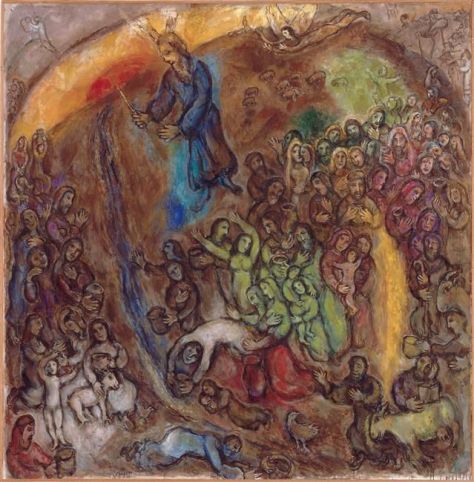by Rick Gwynallen

In Parashat Chukat we have the moment in which Moses strikes the rock instead of speaking to it to get water from it (Numbers 20:7-8, 11), and in doing so loses the right to enter the Promised Land.
For me, the message always seemed simple. We are all human. We can take only so much stress, only so many burdens, before our human frailty betrays us. For Moses that was anger.
The stage was set for Moses’ emotions to overwhelm him, to lose sight of what was for the sake of heaven. He had bourne the burden of the exodus and the internal struggles of his people, he had accepted the awesome responsibility, and now he grieves for his sister. Grief and exhaustion are a potent brew.
It seemed a reminder that no matter how great we become we are all human. Mistakes will be made. Moses, the greatest prophet of all, was not immune from error. Still, for us humans, there is no gain without struggle, and no successes without failure. Disgrace is not the result of failure, nor is greatness the result of perfection.
It reminds me of a statement by Teddy Roosevelt:
It is not the critic who counts; not the man who points out how the strong man stumbles, or where the doer of deeds could have done them better. The credit belongs to the man who is actually in the arena, whose face is marred by dust and sweat and blood; who strives valiantly; who errs, who comes short again and again, because there is no effort without error and shortcoming; but who does actually strive to do the deeds; who knows great enthusiasms, the great devotions; who spends himself in a worthy cause; who at the best knows in the end the triumph of high achievement, and who at the worst, if he fails, at least fails while daring greatly, so that his place shall never be with those cold and timid souls who neither know victory nor defeat.
The credit goes to those who do not shirk from the struggle, despite their failings. There are many possible explanations for why this was such a serious error, but I never really connected that error to Moses not being allowed to enter the Promised Land as due to a flaw in Moses’ character. For me, it was just a showing that not every leader is meant for every task. Just because Moses was the one to lead the Israelites out of slavery, through the transformation of the wilderness years, and to the precipice of the Promised Land does not mean he was the leader needed to occupy the land and build a new society. In fact, it seemed that the people would be too dependant upon him, to much expecting miracles from G-d. If Moses even got water from the rock when he didn’t follow G-d’s instructions how could anyone else compare to him?
But more than a comment on human limitations, perhaps the message in Chukat is more about the role we play in a larger story.
When I was in my teens I read a line in one of Che Guevara’s lectures to youth in which he described each of us activists as long distance swimmers in a cross-ocean relay race. We each had the objective of reaching the distant shore, the new world we strove to create, but even if, though swimming with all our might and stamina, we could not reach that shore, it was of no matter because another would pick up from where we gave out and they would not have as far to swim. We will not all have the privilege to live in the new world we work to bring into being, but we do have the privilege of helping to bring it into being.
There are promised lands we will not enter, futures we helped shape but which we will not enjoy. It is the inevitable lot of the mortal. But we are not alone in the universe as the existentialists might have it. Nor are we insignificant. Nor is life is a tragedy. At least not as long as we live our lives as part of something greater than ourselves. We are participants in a story that is as old as time and that will last, page after page, as long as humankind exists. In this great river of life it is our responsibility to bear our cultures into the future, to shape a better world, and live with meaning. Small lives become spiritually rich and great ones in that struggle.
Moses could see but not enter the Promised Land, but it did not diminish his legacy. In what may have been his last poem, the Sufi poet Yunus Emre, wrote that he could not complete his work with the prayer. He could not complete it, but he lived it.
Perhaps the greatest dreams, the worthiest goals, are those that are unattainable, that draw forth love from us to inspire us to live our days fully with purpose and meaning and for others, and do our part in a story greater than ourselves.
